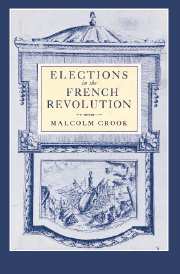Book contents
- Frontmatter
- Contents
- List of maps
- List of tables
- Acknowledgements
- List of abbreviations
- Introduction
- 1 Subjects to citizens? The elections to the Estates General and the Revolution
- 2 Limits of citizenship: The franchise question, 1789–1791
- 3 Biting on the ballot: From enthusiasm to abstention, 1790–1791
- 4 One man one vote? The experiment with electoral democracy in 1792
- 5 Voting the Constitution: The referenda of 1793 and 1795
- 6 Parties, schisms and purges: Elections under the Directory, 1795–1799
- 7 An invisible aristocracy? The departmental assemblies and the emergence of a new political class
- Conclusion
- Bibliography
- Index
6 - Parties, schisms and purges: Elections under the Directory, 1795–1799
Published online by Cambridge University Press: 03 November 2009
- Frontmatter
- Contents
- List of maps
- List of tables
- Acknowledgements
- List of abbreviations
- Introduction
- 1 Subjects to citizens? The elections to the Estates General and the Revolution
- 2 Limits of citizenship: The franchise question, 1789–1791
- 3 Biting on the ballot: From enthusiasm to abstention, 1790–1791
- 4 One man one vote? The experiment with electoral democracy in 1792
- 5 Voting the Constitution: The referenda of 1793 and 1795
- 6 Parties, schisms and purges: Elections under the Directory, 1795–1799
- 7 An invisible aristocracy? The departmental assemblies and the emergence of a new political class
- Conclusion
- Bibliography
- Index
Summary
The Constitution of 1795 was inaugurated in an inauspicious fashion and enjoyed a charmed existence until it was overturned four years later. This was longer than either of its predecessors, but because the Directory came to an ignominious conclusion historians have been only too willing to write it off as a bad job and to overlook its achievements, especially in the political sphere. The significance of the electoral apprenticeship that was conducted during the second half of the revolutionary decade has largely escaped attention as a result. It is seldom recognised that the franchise remained a very broad one, or that in two of the annual elections which were held the level of participation was reasonably high. An interesting experiment with declared candidatures was also undertaken, despite a dogged reluctance to endorse the existence of parties, which were more effectively organised than ever. If government intervention of the most blatant sort brought the electoral system into disrepute, the unprecedented involvement of the executive was nonetheless a reflection of the crucial role that elections now played in the political process.
The Directory is rarely viewed in a positive light and its electoral contests are usually regarded as fiascos which attracted only a derisory turnout.
- Type
- Chapter
- Information
- Elections in the French RevolutionAn Apprenticeship in Democracy, 1789–1799, pp. 131 - 157Publisher: Cambridge University PressPrint publication year: 1996

